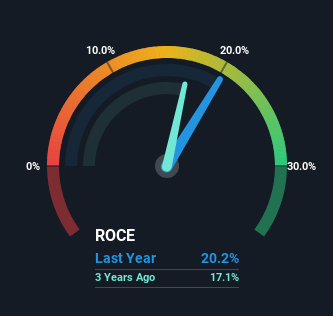Rockwell Automation (NYSE:ROK) Is Reinvesting At Lower Rates Of Return
If we want to find a stock that could multiply over the long term, what are the underlying trends we should look for? In a perfect world, we'd like to see a company investing more capital into its business and ideally the returns earned from that capital are also increasing. Put simply, these types of businesses are compounding machines, meaning they are continually reinvesting their earnings at ever-higher rates of return. So when we looked at Rockwell Automation (NYSE:ROK), they do have a high ROCE, but we weren't exactly elated from how returns are trending.
Understanding Return On Capital Employed (ROCE)
For those that aren't sure what ROCE is, it measures the amount of pre-tax profits a company can generate from the capital employed in its business. The formula for this calculation on Rockwell Automation is:
Return on Capital Employed = Earnings Before Interest and Tax (EBIT) ÷ (Total Assets - Current Liabilities)
0.20 = US$1.6b ÷ (US$11b - US$3.7b) (Based on the trailing twelve months to March 2024).
Therefore, Rockwell Automation has an ROCE of 20%. In absolute terms that's a great return and it's even better than the Electrical industry average of 14%.
Check out our latest analysis for Rockwell Automation
In the above chart we have measured Rockwell Automation's prior ROCE against its prior performance, but the future is arguably more important. If you'd like, you can check out the forecasts from the analysts covering Rockwell Automation for free.
What The Trend Of ROCE Can Tell Us
When we looked at the ROCE trend at Rockwell Automation, we didn't gain much confidence. To be more specific, while the ROCE is still high, it's fallen from 30% where it was five years ago. On the other hand, the company has been employing more capital without a corresponding improvement in sales in the last year, which could suggest these investments are longer term plays. It may take some time before the company starts to see any change in earnings from these investments.
Our Take On Rockwell Automation's ROCE
Bringing it all together, while we're somewhat encouraged by Rockwell Automation's reinvestment in its own business, we're aware that returns are shrinking. Although the market must be expecting these trends to improve because the stock has gained 93% over the last five years. However, unless these underlying trends turn more positive, we wouldn't get our hopes up too high.
Rockwell Automation does have some risks though, and we've spotted 1 warning sign for Rockwell Automation that you might be interested in.
If you want to search for more stocks that have been earning high returns, check out this free list of stocks with solid balance sheets that are also earning high returns on equity.
Have feedback on this article? Concerned about the content? Get in touch with us directly. Alternatively, email editorial-team (at) simplywallst.com.
This article by Simply Wall St is general in nature. We provide commentary based on historical data and analyst forecasts only using an unbiased methodology and our articles are not intended to be financial advice. It does not constitute a recommendation to buy or sell any stock, and does not take account of your objectives, or your financial situation. We aim to bring you long-term focused analysis driven by fundamental data. Note that our analysis may not factor in the latest price-sensitive company announcements or qualitative material. Simply Wall St has no position in any stocks mentioned.

 Yahoo Finance
Yahoo Finance 
